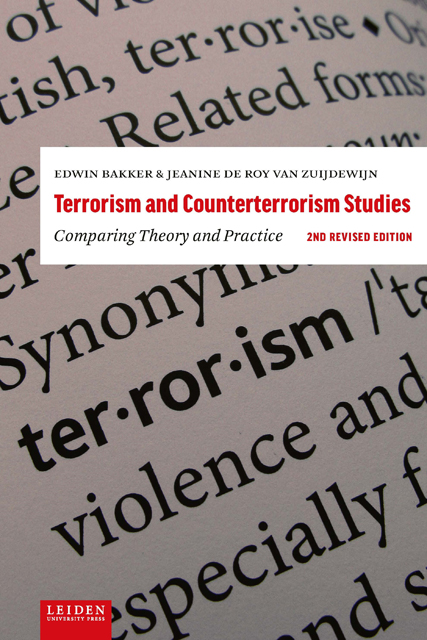Book contents
- Frontmatter
- Contents
- List of boxes & figures
- Preface
- About the authors
- Acknowledgements
- 1 Definition and nature of terrorism
- 2 History of terrorism
- 3 Terrorism studies
- 4 Assumptions about terrorism
- 5 Assumptions about counterterrorism
- 6 Dealing with the impact of terrorism
- 7 Trends and developments in (counter)terrorism and a future research agenda
- Index
Preface
Published online by Cambridge University Press: 12 January 2023
- Frontmatter
- Contents
- List of boxes & figures
- Preface
- About the authors
- Acknowledgements
- 1 Definition and nature of terrorism
- 2 History of terrorism
- 3 Terrorism studies
- 4 Assumptions about terrorism
- 5 Assumptions about counterterrorism
- 6 Dealing with the impact of terrorism
- 7 Trends and developments in (counter)terrorism and a future research agenda
- Index
Summary
The field of terrorism and counterterrorism studies has grown exponentially since the attacks on the United States on September 11, 2001. The terrorist attacks on that day are among the defining features of the 21st century and terrorists are still making headlines worldwide, threatening or attacking governments and ordinary citizens. In some parts of the world, terrorism has been one of the most important threats to peace, security and stability. Yet in most parts it received a lot of attention without constituting a primary threat, let alone a strategic threat. But what does this mean? What is the nature of this threat and how does it ‘work’? Who or what is threatened, how, by whom and why? And what can be done about it, or how can we at least limit the impact of terrorism and make sure that terrorists do not manage to spread fear, dread or anxiety?
These are just a handful of questions that we address in this revised textbook that accompanies the Massive Open Online Course on Coursera and FutureLearn: ‘Terrorism and Counterterrorism: Comparing Theory & Practice’. This undergraduate level course was first launched in September 2013 and has attracted over 180,000 participants from more than 80 countries. The course and this handbook have been completely revised in 2022. The revised edition discusses recent trends and developments and uses many new studies that shine a different light on certain topics. Additionally, it pays more attention to the important question what we can do to deal with the impact of terrorism on politics and society. The input from the course participants from all across the world and students at Leiden University helped us to develop our thoughts for this revised edition.
The aims of both the online course and this textbook are to learn more about:
• The notion of terrorism as an instrument to achieve certain goals.
• The difficulties and importance of definitions of terrorism.
• The state of the art of terrorism studies.
• Theoretical notions and practical examples to better understand the phenomenon of terrorism.
• Theoretical notions and practical examples to better understand and critique approaches to counterterrorism.
• How to deal with the impact of terrorism.
• Possible futures of terrorism and terrorism studies.
- Type
- Chapter
- Information
- Terrorism and Counterterrorism StudiesComparing Theory and Practice, pp. 13 - 16Publisher: Amsterdam University PressPrint publication year: 2022



